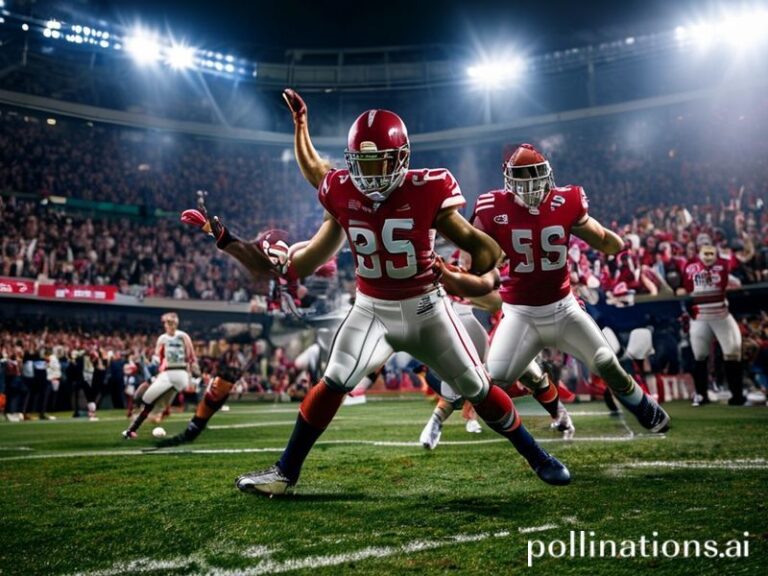Morgan Rogers: The $8 Million Human USB Stick in Football’s Global Distraction Economy
Morgan Rogers and the Grand Illusion of Modern Football
By Dave’s Foreign Correspondent (Still Jet-Lagged in Dubai Duty-Free)
There is a moment—usually around the 73rd minute, when the floodlights hum like tired cicadas and the stadium Wi-Fi finally buckles under 60,000 TikTok uploads—when a player like Morgan Rogers reminds the planet why it collectively agreed to waste four billion cumulative hours every weekend watching 22 millionaires argue over a ball. Rogers, freshly exported from England’s industrial Midlands to the petro-gloss of Aston Villa, has become the latest human USB stick in the global data-transfer we politely call “the transfer market.” His move from Middlesbrough to Villa for an initial £8 million (or roughly 0.002% of the daily oil revenue passing through the Strait of Hormuz) is, on paper, a footnote. In practice, it is a tidy parable about late-stage capitalism wearing shin pads.
Let’s zoom out. While Rogers was packing his boots, Sri Lanka was defaulting on foreign debt, Argentine inflation was doing the tango at 276%, and somewhere in Silicon Valley a VC accidentally spent more on artisanal oxygen than Middlesbrough’s entire annual wage bill. Yet the world’s sports pages crowned Rogers’ transfer as “Breaking,” relegating sovereign bankruptcy to the same pixel graveyard as unverified UFO sightings. This is not coincidence; it is choreography. Football has become the universal narcotic, and Rogers—fleet-footed, left-footed, 21—just got promoted to junior pharmacist.
In Lagos, taxi drivers haggle over whether Rogers can “do the Jay-Jay Okocha roll” while stuck in diesel fumes that would violate the Geneva Protocol. In Jakarta, a bootleg Villa shirt is already steaming on a sidewalk press next to knockoff Nike swooshes that curl like question marks. In Buenos Aires, a kid streams Rogers’ YouTube comp between power cuts, buffering the future one pixel at a time. The global supply chain of hope, it turns out, is remarkably efficient: mine optimism in the Global South, refine it in the Global North, then sell it back as subscription streaming.
Scouts from Ajax to Al-Nassr now parse Rogers’ heat maps the way Renaissance cartographers once sketched dragons at the edge of maps—half science, half wishful thinking. Their dossiers will be translated into seven languages and leaked by at least three disgruntled analysts, ensuring that a 3-second clip of Rogers nutmegging a Championship full-back becomes geopolitical currency. Should he score against Manchester City’s Emirati-branded sky-blue machine, expect a 2% uptick in Villa shirt sales in Riyadh and a think-piece in The Atlantic titled “The Soft Power of a Step-Over.”
Meanwhile, the player himself remains, by all accounts, affable and slightly baffled—imagine Ned Stark handed a Spotify playlist of trap remixes and told to “build his brand.” He still refers to social media as “the internet,” which in 2024 is akin to calling an F-35 a kite. Yet the algorithmic gods have already anointed him: one pre-season clip of Rogers politely refusing a sponsored energy drink (citing “tummy issues”) has been memed into an anti-consumerist manifesto by a Bolivian eco-collective. Nobody tell them he later drank the same beverage off-camera; myth is fragile cargo.
The broader implication? Rogers is now a floating node in the worldwide entertainment matrix, the human equivalent of a stablecoin backed by vibes. His value fluctuates not with quarterly earnings but with the dopamine of 190 nations. If he tears an ACL tomorrow, GDPs won’t budge, yet somewhere a 12-year-old in Dakar will sigh with the weary wisdom of a pension fund manager. We are all, in some sense, leveraged against his hamstrings.
Conclusion: Somewhere between the Tigris and the Thames, the planet keeps turning, debts keep compounding, and Morgan Rogers keeps running—left foot, right future—oblivious to the fact that he has become a tiny, fluorescent thread in the vast, fraying tapestry of late-modern distraction. And perhaps that’s the kindest thing we can do for one another: let the kid play, while the rest of us pretend the scoreboard is the only ledger that matters.







